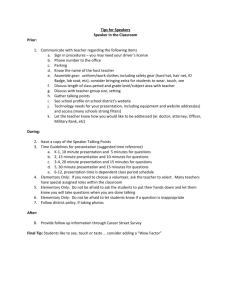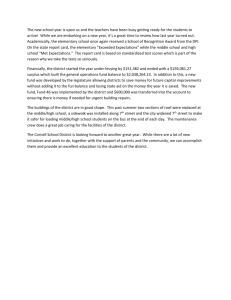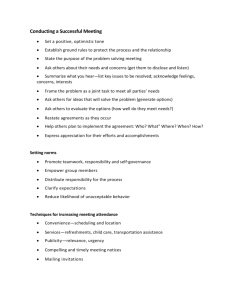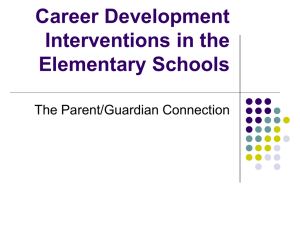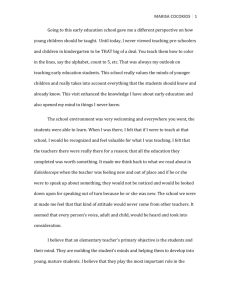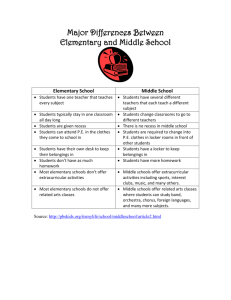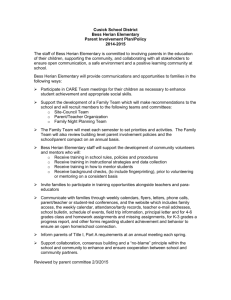MUSC 3900—Music in the Elementary Schools
advertisement
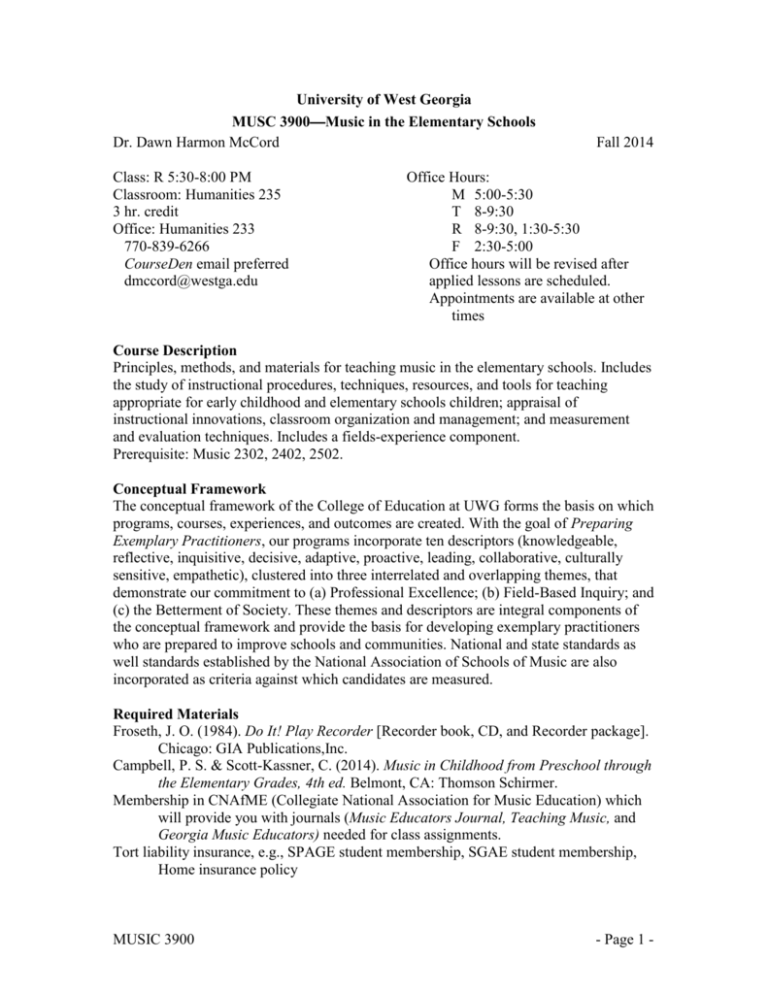
University of West Georgia MUSC 3900—Music in the Elementary Schools Dr. Dawn Harmon McCord Class: R 5:30-8:00 PM Classroom: Humanities 235 3 hr. credit Office: Humanities 233 770-839-6266 CourseDen email preferred dmccord@westga.edu Fall 2014 Office Hours: M 5:00-5:30 T 8-9:30 R 8-9:30, 1:30-5:30 F 2:30-5:00 Office hours will be revised after applied lessons are scheduled. Appointments are available at other times Course Description Principles, methods, and materials for teaching music in the elementary schools. Includes the study of instructional procedures, techniques, resources, and tools for teaching appropriate for early childhood and elementary schools children; appraisal of instructional innovations, classroom organization and management; and measurement and evaluation techniques. Includes a fields-experience component. Prerequisite: Music 2302, 2402, 2502. Conceptual Framework The conceptual framework of the College of Education at UWG forms the basis on which programs, courses, experiences, and outcomes are created. With the goal of Preparing Exemplary Practitioners, our programs incorporate ten descriptors (knowledgeable, reflective, inquisitive, decisive, adaptive, proactive, leading, collaborative, culturally sensitive, empathetic), clustered into three interrelated and overlapping themes, that demonstrate our commitment to (a) Professional Excellence; (b) Field-Based Inquiry; and (c) the Betterment of Society. These themes and descriptors are integral components of the conceptual framework and provide the basis for developing exemplary practitioners who are prepared to improve schools and communities. National and state standards as well standards established by the National Association of Schools of Music are also incorporated as criteria against which candidates are measured. Required Materials Froseth, J. O. (1984). Do It! Play Recorder [Recorder book, CD, and Recorder package]. Chicago: GIA Publications,Inc. Campbell, P. S. & Scott-Kassner, C. (2014). Music in Childhood from Preschool through the Elementary Grades, 4th ed. Belmont, CA: Thomson Schirmer. Membership in CNAfME (Collegiate National Association for Music Education) which will provide you with journals (Music Educators Journal, Teaching Music, and Georgia Music Educators) needed for class assignments. Tort liability insurance, e.g., SPAGE student membership, SGAE student membership, Home insurance policy MUSIC 3900 - Page 1 - Tk-20--electronic portfolio required by UWG-College of Education for assessment, field placement, and certification. ASO Symphony ticket sold by CNAfME, $12. Schedule conflicts will be addressed with a different ASO in consultation with professor. Supplementary Materials Bourne, P. (2009). Inside the elementary school chorus: Instructional techniques for the non-select children’s chorus. Dayton, OH: Heritage Music Press. Brophy, T. S., & Abrahams, F. (2010). The practice of assessment in music education: Frameworks, models, and designs. Chicago: GIA Publications.Lindeman, C. A. (2011). Musical children: Engaging children in musical experiences. Upper Saddle River, NJ: Prentice Hall. Robinson, A., Shore, B., & Emerson, D. (2007). Best practices in gifted education: An evidence-based guide. Waco, TX: Prufrock Press. Sobel, E. S. (2008). An attitude and approach for teaching music to special learners. Lanham, MD: MENC/Rowman & Littlefield Education. Wade, B. C. (2004). Thinking musically: Experiencing music, expressing culture. New York: Oxford University Press. Objectives/Learning Outcomes Each student will: 1. Expand their knowledge and understanding of principals/theories/ approaches for teaching and assessing music instruction in elementary schools attenuating that all students from diverse backgrounds can learn 2. Become familiar with instructional materials, resources and tools used in teaching music in elementary schools including the introduction of multicultural issues and approaches to addressing diversity 3. Develop classroom organization, procedures, and management skills based on fairness when actuating the implementation of same 4. Observe music teachers in elementary music classes for teaching strategies, learning styles, and processes used 5. Perform on instruments used in elementary music Methods The class will be taught by lecture, demonstration, discussion, observation, and student presentations. Students will 1. Demonstrate proficiency in on recorder, Orff and classroom instruments. 2. Teach songs using prescribed pedagogy. 3. Plan lessons for listening, playing an instrument, singing and movement, creating/reading/notating music. 4. Develop an assessment instrument for use in a lesson designed by the student. 5. Demonstrate knowledge of theories/approaches for elementary music curriculum. 6. Complete field experiences in an elementary music classroom. MUSIC 3900 - Page 2 - UWG Common Language Syllabi Information It is important that you review and understand the statements that are common to all courses at UWG. These items address the Americans with Disabilities Act, UWG Email Policy, Credit Hour Policy, and the University of West Georgia Honor Code. These statements may be viewed at (Mozilla or Chrome browser): http://tinyurl.com/UWGSyllabusPolicies Evaluation Teaching Activities1 .................................................................................................... 30 % Unit Plan and Individual Lesson Presentation Rote Song Presentation Group Lesson Presentation Song Project Reconstructed Field Lesson Plan Listening Map Presentation Field Observations2 ..................................................................................................... 30 % Pre-Kindergarten Elementary School Performance and Knowledge Based Activities ........................................................... 20 % Accompanied Song Performance Recorder (Final) Song Performance (Final) Orff Arrangement/Presentation Quizzes, tests Professional Activities ................................................................................................. 20% Music Education History and Trends Paper and Presentation Journal reports and Presentation Philosophy CNAfME Membership Tk20 Submissions No extra credit is given in this class. Assignments are due on given class date and considered late after 5:40 pm. No assignments will be accepted late. Unless assigned otherwise, students must print their own documents. Attendance Learning and participation is only possible if the student participates in class and receives the essential information. Since the course will move at a very fast pace with written 2 No partial credit is given if less than thirty (30) hours are completed. If observation reports are incomplete or unsatisfactory in requested detail, a penalty will be imposed. MUSIC 3900 - Page 3 - work due on a regular basis, students are expected to attend every class meeting. Should a student not be able to attend a class, he/she is responsible for the information covered and assignments. Even if student is absent, presentations and assignments must be completed on their assigned day with written assignments turned in no later than 5:40. Absence or lateness will result in 4 points being subtracted from the student’s final points for each absence for any reason beyond one absence. One point subtracted per tardy. Field Experience Students in Music 3900 are required to have two 30 hours total in the field. Four of the 30 hours will take place at the UWG Child Development Center and 26 hours will be at an assigned elementary school. A background check completed by the COE Office of Field experiences must be successfully completed before observations may be begun. Do not enter assigned school until you have received an official placement notice by the COE Office of Field Placement. For every observation, students must complete and turn in observation forms. These forms must be completed in ink. Completed forms should be turned in weekly and will be filed in student files located in the music department office at the end of the semester. Under extreme circumstances, a student may be granted permission to turn in observation forms after the deadline with a penalty imposed. After observation submission deadline, a penalty of 5 points will be subtracted for each day that forms are late, including weekends. Students who have not completed 12 documented hours of their field assignment by the mid-point of the term may be withdrawn from this course and receive a grade of W. These 12 hours musit be from the following two settings: Preschool observations (4 hours). Failure to sign up for field participation in the first week may not be used for excuse. The Child Development Center rarely allows make up observations as they have students from the COE coming in after music students have completed their field experiences. Elementary School observations (8 hours) by the mid-point of the term. Field Observation Forms Copy the field observation form as needed. The form must be completed in ink during the observation and the attending teacher must sign the form in ink at the end of each observation. Each student will have a file for collecting forms each week. The deadline for turning in the forms is in the course schedule. If forms do not record class procedures identified on the form, 8 points will be deducted from total observation points. Calendar The following is a tentative and flexible plan and will be amended as necessary. All changes will be announced in class or on CourseDen. It is your responsibility to check CourseDen for communiqués. MUSIC 3900 - Page 4 - Week Month Topics, Activities & Assignments 28 Singing, Class/Text information; Music concepts; Music activities; choosing a song and Teaching a song by rote; Introduction to recorder; Music in the preschool; How to write a personal philosophy; Observation Reports; Preschool activities and development; selection of symphony repertoire assignments. September 4 Class Activities: Rote Song Presentations, Preschool presentations, Recorder, Assignments of Music Education paper/presentation topics. Class topics: National Standards and Quality Core Curriculum, History and Trends of Music Education, Elements of music, Test I Overview (music education history, National Standards, Georgia Performance Standards); Philosophy of Music Education); Campbell textbook reading assignment; Creating a Listening Map. Campbell textbook reading assignment. 3 11 Class Activities: Test 1 (points given for completed field observation hours and forms); Recorders; Listening/Playing Instruments: Teaching Music report; Assignment of Music Education topics; Personal philosophy due. Accompanied Songs performed (3). 4 18 In CourseDen Discussion, identify your Journal Article (first come first serve with no repeated articles). Journal review should be posted on CourseDen by 5:00 PM 9/18; Ethics for the Georgia Educator; Accompanied Songs performed (3). 5 25 Class Activities: Music Education History and Trends Presentations; Select lesson for group presentation; Declare in which in-field class you plan to teach your lesson: Class Topics: Movement; Campbell textbook reading assignment; Creating/Reading/Notating music. Accompanied Songs performed (4). 6 2 Class Activities: Group Lesson Presentations; Declare which elementary grade and class for which you plan to teach your lesson. Accompanied Songs performed (4). 9 Listening Map Lesson Presentations (Selections drawn from ASO Program) The Song Project. Accompanied Songs performed (4). 2 October August 1 Date 7 MUSIC 3900 - Page 5 - Week Month Date Topics, Activities & Assignments 16 Class Activities: Listening Map Lesson Presentations, Reconstructed Field Lesson Plan Due. Class Topics: The Unit Plan; Discipline; Preparing the song project; Test II Overview; Preparing the Unit Lesson Plan; Basal Series Critique. Students who have not turned in completed forms for 12 hours of observations (4 Preschool and 8 Elementary) will be withdrawn from class 9 23 Class Activities: Recorder Test (Part of Test 3), Step 1 of Unit Plan due. Class Topics: Special Learners, Approaches, Theories, and Methodologies. Campbell textbook reading assignment; Methods of Teaching Music to Children. Basal Series Critique Due. 10 30 Step 2 of Unit Plan due along with written plan and assessment due Submitted in CourseDen; Lesson Plan Presentations 11 6 Critiques of Lesson Plan Presentations due online by 5:30 PM. Required attendance of Carroll Symphony Orchestra Concert November 8 7 Department trip to Atlanta Symphony Orchestra; Tickets sold Friday by Collegiate Chapter of the National Association of Music Educators; Friday, Nov. 7 (6:30 start time; 4:35 bus departure time if seat has been reserved)--Beethoven's Leonore Overture No. 2 and Brahms Symphony No. 1 12 13 Listening Maps Submitted through CourseDen with individual critiques of each presentations; Test 2 through CourseDen; 13 20 Curriculum Planning; Campbell textbook reading assignment; Teach Lesson in the school 24-26 Thanksgiving—No class December 14 Final MUSIC 3900 4 Observation reports due (No forms will be accepted after this class); Last day to teach your lesson in the school; Review for final. Song Portfolio due; Campbell textbook reading assignment 11 5:30 PM (Final will not be given early) Song Performance Recorder Performance Written Examination - Page 6 - Disclaimer Instruction contained in this syllabus was, to the knowledge of the instructor, considered correct and complete when distributed for use; however, this syllabus should not be considered a contract between University of West Georgia and the student. The instructor reserves the right to make changes in course content or instructional techniques without notice or obligation. MUSIC 3900 - Page 7 -
